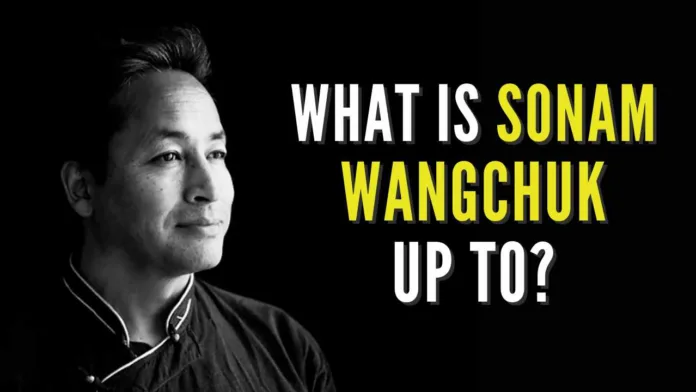
Political explosions
The trans-Himalayan Ladakh has been witnessing political explosions at regular intervals since 2020 — just a year after (August 5, 2019) the Narendra Modi government met the Buddhists’ long-standing demand seeking Union Territory status for the region. The fundamental reason: The insistence of Buddhist Leh-based Apex Body (LAB) and Shiite Kargil-based Kargil Democratic Alliance (KDA) on the Sixth Schedule of the Indian Constitution so that the Ladakhis could control the entire land and all the jobs and full State status for the region, coupled with an elected Legislative Assembly, and the Union Home Ministry’s no to their demands taking into consideration the geopolitical importance of the cold-desert, or threat to the region from both the aggressors, China and Pakistan.
A riddle
It needs to be underlined that Kargil’s leadership had consistently opposed the politics, Buddhist style as well as the Buddhists’ demands seeking separation from Kashmir, integration of Ladakh into Jammu or Himachal Pradesh (East Punjab), or Central rule in the region by converting it into a Union Territory. To be more precise, the relations between overwhelming Buddhist Leh and overwhelming Shiite Kargil were bitter and rancorous, particularly since 1979.
In 1979, Sheikh Abdullah created the Muslim-majority Kargil district out of the Buddhist-majority Ladakh district to pit his co-religionists against the Buddhists to puncture and defeat their movement for separation from Kashmir and Union Territory status. The Buddhists’ leaders like the Head Lama of Ladakh, Kushok Bakula Rinpoche, had threatened that they would “join up Tibet” or create “another Tibet” in case the Centre failed to separate Ladakh from Kashmir and bring the whole region under the Central rule.
Why the former BJP MP Thupstan Chhewang-led Ladakh Buddhist Association (LBA) or the Buddhist leadership shook hands with the KDA in 2020 overlooking what the Kargil leadership – backed to the hilt by the successive Kashmiri Muslim-dominated governments in the State — had done between 1979 and 2019? It’s a riddle.
Grievous injury
It’s also difficult to understand why the otherwise alert and politically awakened Buddhist leadership failed to appreciate what would follow on the conversion of Ladakh Union Territory into the State of Ladakh, coupled with an elected Legislative Assembly, given the fast-changing demographic profile of Ladakh.
Buddhists, it needs to be noted, constitute less than 40% of Ladakh’s population and Muslims are a majority in the region, which was till 1981 a Buddhist-majority region. It is hardly necessary to reflect on what kind of political status the Buddhists would enjoy in case Ladakh is declared a full-fledged State. Suffice it to say that the Buddhists and their religion, culture, society, and economy would suffer a grievous injury and the Shiite Kargil would exercise veto power like the Kashmiri Muslim leadership exercised veto power in the erstwhile State of Jammu and Kashmir between 1947 and June 2018.
Equating Bharat with China
Notwithstanding the fact that the LAB, in collaboration with the KDA, has been causing political explosions at regular intervals in and outside Ladakh, including Jammu and Delhi, Thupstan Chhewang and similar other Buddhist leaders never ever adopted a radical approach. They hardly made any disturbing and controversial statements during all these years of agitation. It is “educationist”, Magsaysay Award winner, a critic of Lord Rama, and environmentalist, Sonam Wangchuk, who has been leaving no stone unturned to give a radical orientation to the Ladakhi movement through his disturbing actions and threats, including the threat of fast-unto-death, and provocative and controversial statements.
An integral part of the LAB as he is, Wangchuk has been pursuing a line that has the potential of hurting the nation’s paramount interests in the cold-desert Ladakh. It would be only appropriate to quote verbatim his certain statements to put things in perspective and establish that his intentions are not really pious.
Take, for example, what he said about the Army and the attitude of the Central government towards Ladakh. Wangchuk, according to the Delhi-based journal, Border Affairs, (April-June, 2024), said: “The morale of Indian soldiers stationed in the Union Territory facing China and Pakistan was at its weakest due to purported discontent among its three most battle-hardened components – Ladakhis, Sikhs, and Gorkhas…Wangchuk has based his observations regarding the weakened morale of the soldiers on the premise: ‘That is because of the most battle-hardened forces like Ladakh Scouts, Sikh Regiment and Gorkhas…The morale of Ladakhi soldiers is broken because Ladakh has neither democracy nor reservation…The morale of Sikh soldiers is also weak because of the protests that take place in Punjab, which also impacts them. For the last four years, Gorkha soldiers have been refusing to join (army) because of Agniveer’ (short-term recruitments).”
The border Affairs, in addition, said: “This is not the first instance where Wangchuk has made such controversial utterances. About four years ago, he circulated a series of videos titled ‘Maan ki Baat (message from the heart) of Ladakh…’ In these videos, he made the utterances like the ‘Tibetaisation of Ladakh’, ‘the people might be driven into a corner losing their gratitude and patriotism; the people of the region think that what is happening here (in Ladakh) is what China did in Tibet; and unfortunately there are murmurs whether the status of a Union Territory was granted for others to exploit the vast resources of Ladakh.”
Threatening fast-unto-death
Ending his 5-day fast on January 30, 2024, Wangchuk, among other things, said: “Today is the last day of my symbolic carbon neutral climatic fast and I am thankful to the people for joining me. The fast was an attempt to invite the attention of the Prime Minister so that our leaders could brief him about their concerns and demands…This was just a symbolic protest and if there was no response, I will go on a hunger strike for 10 days, later 15 days, and so on till my last breath”. (Significantly, Wangchuk had started his 5-day fast on the Republic Day.)
The same day (January 30), he also gave an interview with the news agency ANI and, inter-alia, said: “If the authorities concerned continue to turn a blind eye to the needs of Ladakh and if the UT isn’t provided protection and safeguards from industries, the glaciers there will be extinct, leading to enormous water scarcity and other hazards for the country and its neighborhood…If necessary measures are not taken, industries, tourism, and commerce will continue to flourish in Ladakh and will eventually ruin it”.
Influencing voting pattern
Before ending his 21-day fast on March 26, 2024, he made public his video message. It read: “We do not want to think of Modi ji and Amit Shah ji as just politicians, we would rather like to think of them as statesmen. But, for that, they will have to show some character and farsightedness…A politician thinks of the next election, but a statesman thinks of the next generation…People must use their ballot power very carefully this time in the interest of the nation”.
What exactly does he mean by “this time” and “interest of the nation”? Did he urge the people to vote for the Congress-led I.N.D.I. Alliance? Did he mean the Narendra Modi government had failed to protect and promote the interests of the nation? How else should one interpret his statement given the fact that it was the BJP which had won the lone Ladakh Lok Sabha seat in the 2014 and 2019 general elections? In any case, what Wangchuk said was very meaningful. It conveyed many messages.
Border march
On March 26, Wangchuk went several steps further and threatened to march to the border. He, among other things, said: “We are followers of (Mahatma) Gandhi’s Satyagraha. We are demanding the fulfillment of the promises made to us by this (BJP) government through its manifestos which led its candidates to win Parliamentary polls (in 2019) and Hill Council Polls in Leh (2020)…The first phase of the hunger strike will be followed by a chain hunger strike by women, youths, religious leaders, and elders. On April 7, we will launch a march to Changthang (in the east of Leh along the border with China) like Gandhi’s Dandi March under the Civil Disobedience Movement…He is ready to go on a hunger strike once again if the demands of the people of Ladakh are not met as ‘we are fighting for our future’ and the children”.
Earlier, another video message of his had said: “His climate fast is an opportunity to remind the Government of India of their promise to ‘safeguard and protect the fragile land of the Himalayas and to restore democracy’. On one side, they are losing land to Indian corporates…roughly 150,000 square kms of prime pasture land. And on the other hand, they are losing pasture land to China, which is encroaching from the North, who have captured huge chunks of Indian land in the last five years…10,000 Ladakhis people will March to the borders,” he had said, and added that “the nomadic leaders, who he will march with him, will show us how far they used to go for grazing earlier and now where they have to stop”.
Ladakh on sale?
Wangchuk went to the extent of equating Bharat with China. What exactly did he say? He, inter-alia, said: “We have fought alongside the Indian Army in 1948, 62, 65, 71, 99, and 2020, on the borders, now is the time for people across India to form ‘Friends of Ladakh’ and ‘Friends of Nature Groups’ to pressuring the Government of India to do the right thing…It seems that the BJP has saved us from kidnappers but then put us in the marketplace for sale along with our mothers and sisters…This eco-sensitive region is today out there for sale, where any mining and industrial lobby can do anything…This ‘unwarranted development’ is triggering disasters in Himalayan” regions like Himachal and Sikkim.[1]
Losing good friends
Wangchuk has made umpteen controversial statements on his fast, BJP, and alienation. He has, inter-alia, said: “Why this fast? It’s about truth, it’s about [the] environment, and it’s about democracy…Even when Ladakh was with Jammu and Kashmir for some 70 years, its people have always wanted to be an entity of their own, because it had always been an independent kingdom in the Himalayas like Sikkim, Bhutan, and Tibet…That’s because Ladakh’s topography, environment, culture, and linguistics have all been very different not just from Jammu and Kashmir and India, but the world too…When Ladakh received the tag of a Union Territory (UT) in 2019 (‘much to all our surprise’), the people of Ladakh were very grateful to the ruling party. But their ‘expectation and demand’ had always been that they have a Legislative Assembly, ‘which means the democratic representation of people in an Assembly which will then make laws and policies to manage the fragile ecosystems of these mountains…We were okay with [Article] 370 going because only that could allow Ladakh to be a separate entity. We were okay about that for Ladakh…of course, it’s a different case for Jammu and Kashmir”.
“This [Sixth Schedule] is tailor-made for hilly regions with distinct indigenous tribal communities…Ladakh has 97%. So we were hands-down qualified for that…And we had no doubt that the government that was kind enough to make Ladakh a Union Territory would also give us that. It was a natural no-brainer…The government even kept it in its 2019 election manifesto – it was in fact one of the top three promises they made…So people voted ‘heavily’ for the BJP and the party won from Ladakh. But the BJP didn’t keep their promise…For months, they went silent. They were even upset when we reminded them of this promise…The Government even took police action against anybody who uttered the words ‘Sixth Schedule’, despite it being a provision in the Indian Constitution. So in 2020, Ladakhis decided to boycott the elections to the Hill Council of Leh…But the present government sent a special airplane to Leh, took Ladakhi leaders to Delhi, and appealed to them to let the election proceed. The Government promised they would ‘solve everything’ after the elections…Our tribal indigenous leaders and people are very trusting…So once again, the people of Ladakh ‘voted heavily’ for the BJP and they formed the government for the Ladakh Autonomous Hill Council…Ladakhi people, therefore, ‘are very hurt’ and our ‘only resort’ is to start a movement…So that not only people in Ladakh but all over the nation join us in the support and defence of truth and justice… it’s not just about Ladakh. When somebody makes a promise, they must keep it…It’s like giving a cheque that says Sixth Schedule and then you take it and it bounces. That should not be acceptable. In fact, it should be punishable. That’s why we are on a fast,” Wangchuk has also said.
He has further said: “He is ‘surprised’ that the government is not paying attention to their protest in such a sensitive region, which is surrounded by international borders. Ladakhis have supported the Indian Army, shoulder-to-shoulder, on every occasion across decades…They [the government] will lose a great friend (in this case Buddhists) if they keep treating Ladakh this way…Because Ladakhis will no longer be passionate about risking our lives to help if they feel that the government is not protecting them in any way. It would be badkismati [bad luck] if that happens. And the current ruling party will be responsible for this …”
“…Moreover, the implementation of the Sixth Schedule is not ‘like putting a wall around Ladakh’…Sometimes people say there will be no development, you want industries for jobs, and so on. Jobs and industries can still come; but only with consultations with the local and indigenous people. So all the Sixth Schedule does is form Autonomous Councils, like micro-assemblies, where indigenous people send their chosen elected representatives. And they make the laws and policies for these fragile hills…The Sixth Schedule operates at the district or grassroots level, while statehood operates at the macro, State level because the funds for the State or the Union Territory come from the Union government and right now, this is decided by just one Lieutenant Governor. ‘People from the region will never take decisions’ that come at the cost of the next generation. That’s why it is important for the environment that the sons and daughters of this soil be allowed to make decisions about this peculiar landscape and ecosystem that nobody else is likely to understand,” Wangchuk has also said.
He has further said: “…We are not so excited about material development where there is no limit to what you want and disregard every resource that nature has, disregard human indigenous populations, wildlife, flora, fauna. That’s not development”.
“A government in a democracy is concerned about its votes and seats…Already in Ladakh, it is granted that they have lost the faith of the people, and, therefore, the votes and seat[s]…But that’s not enough, one seat doesn’t matter. That’s why we are reaching out to the rest of India because it’s not just Ladakh’s issue, it’s about what kind of democratic system we are going to have…we want enough numbers of people to join us and this is the only way the government will move on it…So through…media, we want to appeal to the people of India that tomorrow it will be your turn. When it is happening in Ladakh we have to stand up for each other”.
Matter of concern
What Wangchuk said from time to time during all these four years of the movement and the manner in which he said and the nature of his activities is a matter of concern, notwithstanding the fact that some of the issues he and others have been raising are very genuine. Wangchuk would do well to adopt a rational and national approach to the issues facing Ladakh and avoid making controversial and provocative statements. He must appreciate the ground realities as they exist in Ladakh and not do anything that could endanger the very future of his own co-religionists, Buddhists. Will he?
Note:
1. Text in Blue points to additional data on the topic.
2. The views expressed here are those of the author and do not necessarily represent or reflect the views of PGurus.
Reference:
[1] BJP kept Ladakh for sale, will continue protest fast and march towards border: Sonam Wangchuk – Mar 07, 2024, ET
For all the latest updates, download PGurus App.










